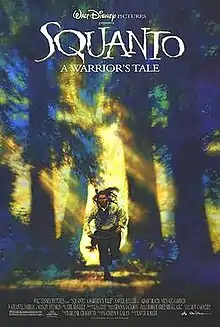Squanto: A Warrior's Tale
Squanto: A Warrior's Tale is a 1994 Canadian-American historical drama action adventure film. It was written by Darlene Craviato and directed by Xavier Koller. It is very loosely based on the actual historical Native American figure Squanto, and his life prior to and including the arrival of the Mayflower in 1620. It stars Adam Beach as the lead role of Squanto. It was originally released theatrically on October 28, 1994, and was shot in Louisbourg and Cape Breton, Nova Scotia.
| Squanto: A Warrior's Tale | |
|---|---|
 Theatrical release poster | |
| Directed by | Xavier Koller |
| Produced by | Kathryn F. Galan |
| Written by | Darlene Craviotto |
| Starring | |
| Music by | Joel McNeely |
| Cinematography | Robbie Greenberg |
| Edited by | Lisa Day Gillian Hutshing |
Production company | |
| Distributed by | Buena Vista Pictures |
Release date |
|
Running time | 102 minutes |
| Country | United States Canada |
| Language | English |
| Box office | $3,337,685[1] |
Plot
Set in the early 17th century, a Patuxet tribesman named Squanto (Adam Beach) is kidnapped by English sailors. He is then taken to England, along with Epenow (Eric Schweig), a Nauset from Martha's Vineyard who was also captured by the English.
When the English ship arrives in Plymouth England, Squanto and Epenow are considered slaves by the employer of the crew, Sir George. Squanto gets thrown in a ring with a giant bear. Their battle becomes a spectacle for the English. Squanto is able to escape, and soon after flees in a row boat. He's discovered, lying unconscious on a rocky shore by a trio of monks who had been fishing.
Squanto is taken into their monastery, in spite of the reluctancy of its head, Brother Paul. The monk who offers the most open arms, Brother Daniel (Mandy Patinkin), becomes a mentor and friend to Squanto. From Brother Daniel, Squanto learns English, and at the same time, he imparts some knowledge about his world to his new housemates, introducing them to moccasins and popcorn. Brother Paul remains skeptical of 'the pagan' and in any possibility of a "New World".
Meanwhile, Sir George firmly believes that Squanto is the property of the Plymouth shipping company, and he has men on the hunt. In another cinematic sequence, Squanto pulls off an improbable escape to accompany Epenow and a crew setting sail back to America.
What Squanto returns to devastates him. His entire tribe (including his wife, Nakooma) has been completely wiped out due to illnesses brought by the Europeans. Epenow wishes to turn violent against the English who mistreated them and when the Pilgrim settlers arrive, the Nauset tribe are ready to do battle, but Squanto manages to settle things peacefully. The last scenes of the film portray the first Thanksgiving celebration.
Cast
- Adam Beach as Squanto
- Sheldon Peters Wolfchild as Mooshawset
- Irene Bedard as Nakooma
- Eric Schweig as Epenow
- Leroy Peltier as Pequod
- Michael Gambon as Sir George
- Nathaniel Parker as Thomas Dermer
- Alex Norton as Harding
- Mark Margolis as Captain Thomas Hunt
- Julian Richings as Sir George's Servant
- Mandy Patinkin as Brother Daniel
- Donal Donnelly as Brother Paul
- Stuart Pankin as Brother Timothy
- Paul Klementowicz as Brother James
- Bray Poor as Doctor Fuller
- Tim Hopper as William Bradford
- John Saint Ryan as Myles Standish
- John Dunn-Hill as Governor John Carver
- Selim Running Bear Sandoval as Attaquin
- David Morley as Monk
- Shaun "Mavs" Gillis as Boy in Crowd
- Brian Sullivan as Canoe Wrangler
Reception
Roger Ebert of the Chicago Sun-Times gave the film only one and a half stars and wrote: ""Squanto" is the kind of superficial, tidied-up, idealized history that might appeal to younger viewers. No thoughtful person will be able to take it seriously. For an incomparably more accurate and evocative portrayal of the earliest contacts between Native Americans and Europeans, see Bruce Beresford's "Black Robe" (1991), which is to "Squanto" as Geronimo is to Tonto."[2] Lois Alter Mark from Entertainment Weekly gave it a C and stated: "Squanto: A Warrior’s Tale, the story of the first Thanksgiving as told by the Native American who brokered the event, has valuable lessons to teach, but it’s so self-conscious (not to mention misguided in parts) that it will probably be out of the theaters long before Turkey Day.".[3] However, on Rotten Tomatoes, Squanto currently holds a 60% rating, based on 10 reviews.[4]
Home media release
Walt Disney Home Video released the film on VHS and widescreen Laserdisc on June 20, 1995. It was released on a widescreen DVD on September 7, 2004.
References
- Squanto: A Warrior's Tale at Box Office Mojo
- Ebert, Roger. "Squanto". Rogerebert.com. Retrieved June 30, 2017.
- Alter Mark, Lois. "Squanto: A Warrior's Tale". Entertainment Weekly. Retrieved June 30, 2017.
- "SQUANTO: A WARRIOR'S TALE (1994)". Rotten Tomatoes. Retrieved June 30, 2017.